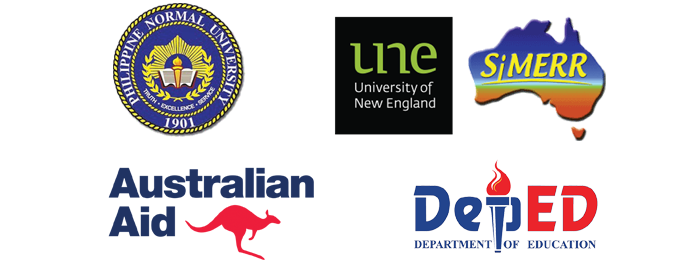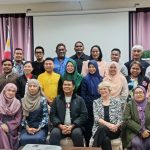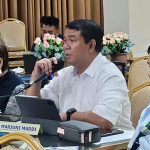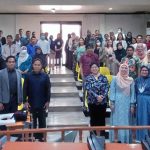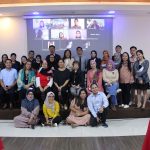WMSU: CQA enables better understanding of pre-service teacher competencies

The WMSU CQA team was recognized at a ceremony in Manila in 2018 for their partnership with RCTQ on the conduct of Curriculum Quality Audit.
Being a leading institution in teacher education in Region IX, academic leaders of the Western Mindanao State University (WMSU) in Zamboanga City felt the need to “continuously innovate” in their academic offerings. In 2017, RCTQ provided them a platform for innovation by becoming among the pioneering teacher education institutions (TEIs) to partner with the Center for the conduct of Curriculum Quality Audit (CQA).
Dr. Simeona Damin, former associate dean of the WMSU College of Teacher Education and a WMSU CQA Specialist, shared that one reason they wanted to join was because they sought to align their curriculum with the Philippine Professional Standards for Teachers (PPST), adopted by the Department of Education in 2017 as DepEd Order No. 42, series of 2017, or the National Adoption and Implementation of the PPST.
“We learned the importance of the PPST. We learned the importance of aligning our subjects with the standards. This made us want to want to undertake a curriculum audit through a partnership with RCTQ,” said Dr. Damin.
Dr. Bernardita Bacang, current department chair of the Bachelor of Elementary Education program who also served as CQA specialist, said that as early as 2013, they had learned about the importance of outcome-based education (OBE) and that “we were hungry for how to do it as we had little knowledge then.”
“CQA was the answer to this ‘hunger’,” Dr. Bacang said. “It incorporates OBE and other educational reforms such as ASEAN Integration, K-12 Implementation.”
Dr Byron Go Silk, dean of WMSU External Studies and another CQA specialist, said that with the PPST at the core, “the CQA process provided WMSU with a review process for its curriculum, instruction and assessment, one that is systematic, criteria/standards- based, objective, reliable, fair, and evidence-based.” He said it gave them a well documented way of reviewing the curriculum, instruction and assessment.”
“There is a better understanding of different competencies that are to be delivered to our pre-service teachers. Now, it is clearer to us what to teach and how to teach them,” said Dr Silk.
Former vice president for academics and current president Dr. Ma. Carla A. Ochotorena initiated the WMSU’s partnership with RCTQ on CQA, which was then fully supported by former university president Dr. Milabel Ho.
A unique form of curriculum mapping, the CQA process enabled WMSU’s College of Teacher Education—a Center of Development for Teacher Education—the opportunity to review its pre-service teacher training curricula and determine its responsiveness to the demands of actual teaching. It allowed for the better understanding of constructive alignment and its significance to the achievement of outcomes at the course, program and institutional levels.
“We thought we had the correct or perfect syllabus then. But we were lacking in alignment,” said Dr. Silk.
“When we started our College of Teacher Education years ago, we would use or recycle our syllabi as making one was never taught to us in college. We would prepare our syllabi individually on our own before. After we learned the CQA process, we learned to do our syllabi from scratch, and learned to sit together with the help of specialists. We now plan together,” Dr. Damin said. She stressed how beginning teacher indicators (BTIs) in the PPST guide them in crafting their syllabi.
Ms. Helen Grace Lao, a faculty member at the WMSU College of Teacher Education, shared that, coming from DepEd before joining WMSU in 2018, she had reservations about what content she would be teaching in college.
“Syllabus making in college teaching was new to me because we were used to making lesson plans in DepEd. But with the help of the WMSU CQA team, I was able to meet with other teachers teaching the same subjects I teach in order to draft our shared syllabi. It really helped me a lot as a newcomer,” Ms Lao said.
Dr. Bacang said the audited curriculum, launched in 2017, is expected to “produce teachers who will be research-oriented and socially-responsive.”
WMSU’s brand of CQA has been shared with other disciplines/programs like Engineering, Nursing, Graduate Programs of the College of Teacher Education, College of Physical Education and Recreation, and Home Economics. The university has 10,000 total students in the main campus and 6,000 to 7,000 students studying in external campuses.
WMSU has also scaled this brand to other TEIs. They have so far signed memoranda of agreement (MOA) with the following institutions allowing WMSU to guide them in their respective CQA journeys: Zamboanga City State Polytechnic College (ZCSPC) and Zamboanga State College of Marine Science & Technology (ZSCMST) both in Zamboanga City; Basilan State College (BaSC) and Claret College of Isabela, both in the province of Basilan; and with the Sulu State College based in Sulu. (AYana/RCTQ)
https://www.rctq.ph/?p=3111FeatureCurriculum Quality Audit

